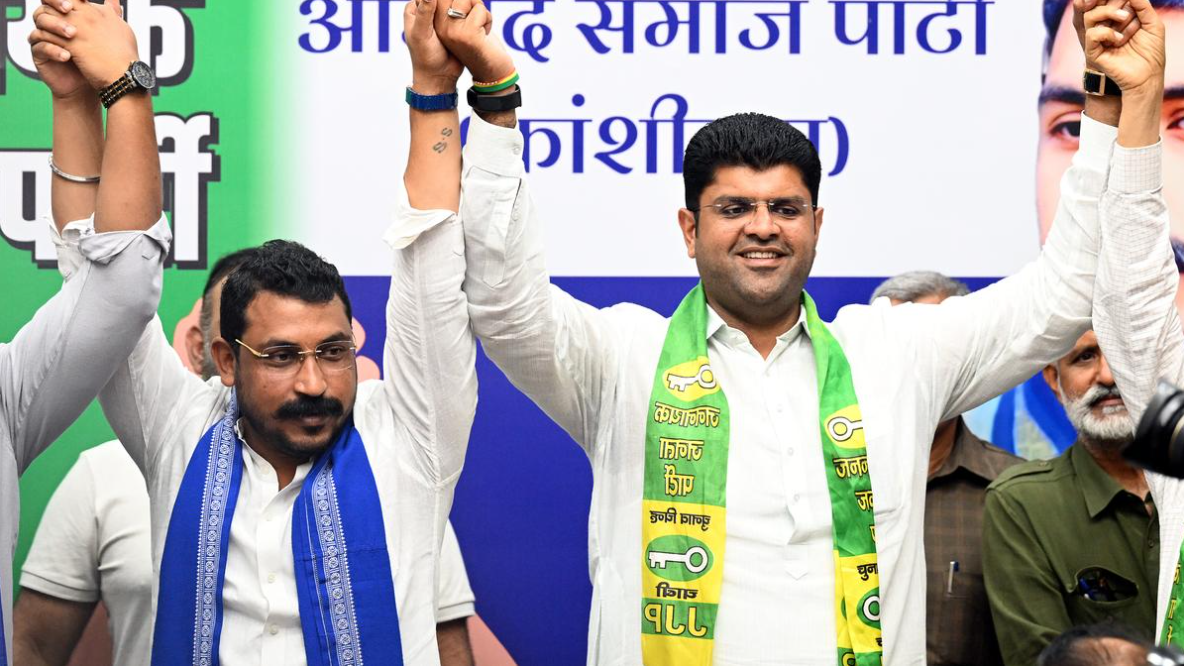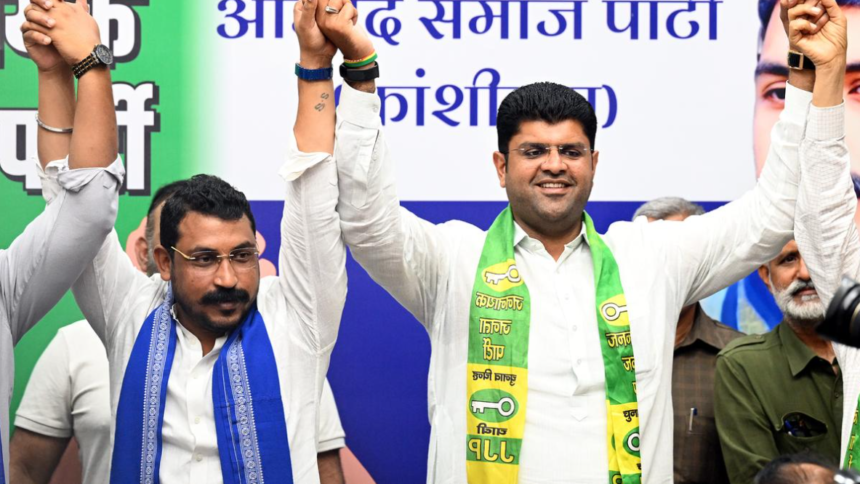JJP and Azad Samaj Party (Kanshi Ram) in a significant political development in Haryana, the Jananayak Janata Party (JJP) and the Azad Samaj Party (Kanshi Ram) have announced a strategic alliance ahead of the upcoming state elections. This alliance is seen as a major shift in Haryana’s political landscape and is poised to have considerable implications for the state’s electoral dynamics. The partnership brings together two distinct political entities with different ideologies and agendas but united by a common objective of influencing the future political trajectory of Haryana.
This article explores the details of the alliance, the motivations behind it, the reactions from various stakeholders, and the potential impact on the forthcoming elections and beyond.
Background of the Parties
Jananayak Janata Party (JJP)
The JJP, founded by Dushyant Chautala in 2019, emerged as a prominent political force in Haryana following its impressive performance in the 2019 Haryana Legislative Assembly elections. The party is known for its focus on issues related to farmers, youth, and regional development. It positions itself as a party committed to social justice and equitable growth, aiming to address the concerns of various marginalized groups.
Azad Samaj Party (Kanshi Ram)
The Azad Samaj Party (Kanshi Ram), led by Chandra Sekhar Azad, is a relatively newer political entity that draws inspiration from the legacy of Kanshi Ram, the founder of the Bahujan Samaj Party (BSP). The party is focused on representing the interests of Dalits, backward classes, and other marginalized communities. It advocates for social justice, economic empowerment, and political representation for these groups.
The Alliance Announcement
The formal announcement of the alliance between JJP and Azad Samaj Party (Kanshi Ram) was made at a joint press conference held in Chandigarh. The event was marked by the presence of key leaders from both parties, including Dushyant Chautala and Chandra Sekhar Azad. The leaders emphasized the strategic nature of the alliance and outlined their shared goals and vision for Haryana.
Key Objectives of the Alliance
- Unified Electoral Strategy: The primary objective of the alliance is to consolidate the vote base of both parties and present a united front in the upcoming elections. By joining forces, they aim to enhance their electoral prospects and challenge the dominance of the ruling Bharatiya Janata Party (BJP) and the Indian National Congress (INC) in Haryana.
- Addressing Marginalized Communities: Both parties have committed to focusing on issues affecting marginalized communities, including economic empowerment, social justice, and improved representation. The alliance seeks to address the concerns of Dalits, backward classes, and other disadvantaged groups, who have traditionally been underserved by the major political parties.
- Regional Development: The alliance plans to prioritize regional development, with a focus on improving infrastructure, education, and healthcare in Haryana. Both parties have expressed a commitment to addressing local issues and promoting sustainable growth.
- Policy Collaboration: The leaders of the alliance have outlined a collaborative approach to policy-making, aiming to integrate the strengths of both parties to formulate effective and inclusive policies. They have promised to work together on key issues such as agrarian distress, unemployment, and social welfare.
 for more information click on this link
for more information click on this link
Reactions and Implications
The announcement of the alliance has elicited a range of reactions from political observers, party supporters, and opposition groups. The impact of the alliance on Haryana’s political landscape is expected to be significant, with potential implications for the upcoming elections and beyond.
Reactions from Stakeholders
- Supporters of JJP and Azad Samaj Party: The alliance has been received positively by supporters of both parties, who view it as a strategic move to enhance their political influence and effectiveness. Enthusiasm among the grassroots supporters has been evident, with rallies and events organized to celebrate the partnership.
- Opposition Parties: The opposition parties, including the BJP and INC, have expressed skepticism about the effectiveness and sustainability of the alliance. Critics have raised concerns about the potential for internal conflicts between the two parties, given their differing ideologies and priorities.
- Political Analysts: Analysts have noted that the alliance could potentially alter the electoral dynamics in Haryana. By consolidating their vote bases, JJP and Azad Samaj Party (Kanshi Ram) may pose a stronger challenge to the traditional political heavyweights. The success of the alliance will largely depend on its ability to present a cohesive and convincing alternative to the existing political options.
Impact on the Upcoming Elections
- Electoral Strategy: The alliance is expected to have a significant impact on the electoral strategy in Haryana. By combining their resources and support bases, the two parties aim to maximize their vote share and increase their chances of securing a substantial number of seats in the state legislature.
- Voter Sentiment: The alliance may influence voter sentiment by presenting a unified and alternative political option. It could attract votes from disillusioned voters who are seeking change and effective representation for marginalized communities.
- Campaign Dynamics: The alliance will likely shape the campaign dynamics, with both parties focusing on their common agenda and collaborative messaging. The effectiveness of their campaign strategy will be crucial in determining their success in the elections.
Key Challenges and Opportunities
The alliance between JJP and Azad Samaj Party (Kanshi Ram) presents both challenges and opportunities. Navigating these effectively will be critical to the success of the partnership.
Challenges
- Ideological Differences: One of the key challenges will be managing the ideological differences between the two parties. While both parties share common goals related to social justice and regional development, their approaches and priorities may differ. Finding common ground and ensuring effective collaboration will be essential.
- Internal Disputes: The alliance may face internal disputes and disagreements, particularly concerning candidate selection and policy formulation. Ensuring a smooth and cohesive partnership will require careful management and negotiation.
- Electoral Competition: The alliance will need to contend with strong competition from established parties like the BJP and INC, which have significant political resources and support. Developing a compelling and distinct electoral message will be crucial to gaining voter support.
Opportunities
- Enhanced Electoral Prospects: By joining forces, JJP and Azad Samaj Party (Kanshi Ram) have the opportunity to enhance their electoral prospects and potentially secure a significant share of the vote. The alliance could enable them to appeal to a broader electorate and gain support from various segments of the population.
- Policy Influence: The partnership provides an opportunity to shape policy discussions and priorities in Haryana. By combining their expertise and resources, the two parties can advocate for important issues and drive meaningful change in the state.
- Increased Representation: The alliance has the potential to increase representation for marginalized communities and address their concerns more effectively. By working together, JJP and Azad Samaj Party (Kanshi Ram) can amplify their voices and promote inclusive policies.
 for more information click on this link
for more information click on this link
Historical Context and Political Landscape
To fully understand the significance of the JJP-Azad Samaj Party (Kanshi Ram) alliance, it is important to consider the historical and political context of Haryana. The state’s political landscape has been characterized by a dominance of traditional parties and shifting alliances.
Historical Political Dynamics
- Traditional Parties: Historically, Haryana’s politics have been dominated by major parties such as the BJP, INC, and regional players like the Indian National Lok Dal (INLD). These parties have established strong political networks and support bases in the state.
- Emergence of New Parties: In recent years, new parties like JJP and Azad Samaj Party (Kanshi Ram) have emerged, challenging the traditional political order. These parties have sought to address specific issues and represent the interests of marginalized groups, gaining traction in the political landscape.
- Shifting Alliances: Haryana has witnessed shifting alliances and realignments in its political landscape. The formation of new alliances and the reconfiguration of political forces are part of the evolving dynamics of the state’s politics.
Impact on Haryana’s Political Future
- Potential Realignment: The JJP-Azad Samaj Party (Kanshi Ram) alliance could contribute to a realignment of political forces in Haryana. The partnership may reshape the state’s political landscape and influence future electoral strategies and alliances.
- Focus on Social Justice: The alliance’s emphasis on social justice and representation for marginalized communities could set a new agenda for Haryana’s politics. It may lead to increased focus on issues related to social equity, economic empowerment, and inclusive development.
- Long-Term Implications: The long-term implications of the alliance will depend on its ability to deliver on its promises and effectively address the concerns of the electorate. Success in the upcoming elections could pave the way for future collaborations and political innovations.
Conclusion
The alliance between the Jananayak Janata Party (JJP) and the Azad Samaj Party (Kanshi Ram) represents a significant development in Haryana’s political landscape. By coming together, these two parties aim to consolidate their efforts and present a united front in the upcoming state elections. The alliance reflects a strategic approach to addressing the challenges of electoral competition and enhancing representation for marginalized communities.
As the alliance navigates the complexities of electoral politics, its success will depend on effective collaboration, a compelling electoral strategy, and the ability to address the concerns of the electorate. The outcome of this partnership will have important implications for Haryana’s political future and could set the stage for new developments in the state’s political arena. ALSO READ:- Labour Minister to Meet Central Trade Unions on UPS, Employment-Linked Incentive Scheme: A Detailed Analysis 2024





